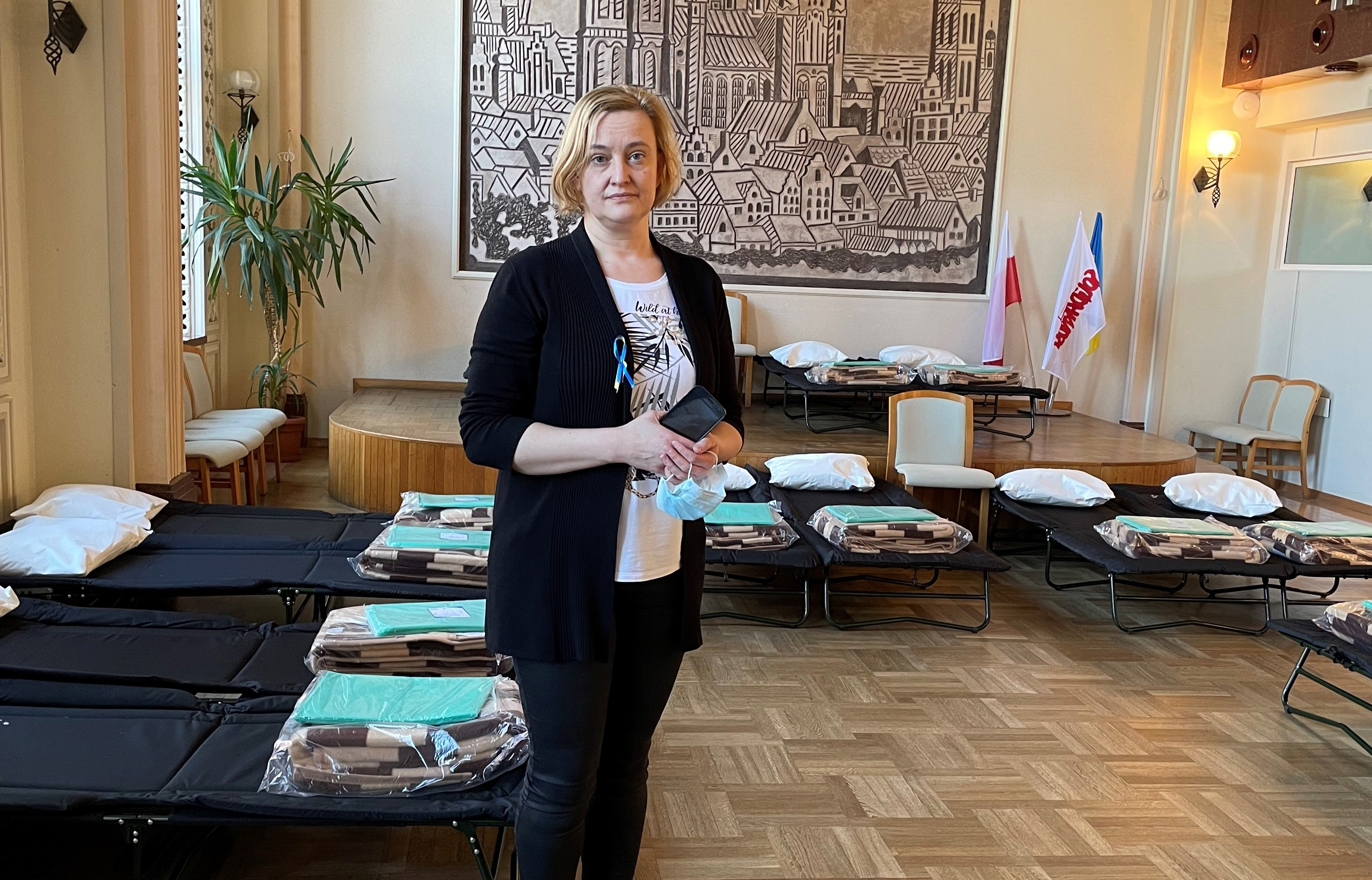Solidarity Polish Union Solidarność opens headquarters to refugees from Ukraine
 Anders Nordanger, Vice President of Fagforbundet Bergen (left) and Agnieszka Rybczyńska from Polish union, Solidarność (right) at a conference organized by Solidarność, March 2022. Photo: Nina Monsen/Fagforbundet.
Anders Nordanger, Vice President of Fagforbundet Bergen (left) and Agnieszka Rybczyńska from Polish union, Solidarność (right) at a conference organized by Solidarność, March 2022. Photo: Nina Monsen/Fagforbundet.Polish union, Solidarność, turns meeting rooms into a temporary reception center for Ukrainian refugees.
“When the refugees arrive, they first of all need food, clothes, medicines and a bed to sleep in,” says Agnieszka Rybczyńska.
She works for Solidarność and collaborates with the Norwegian Union of Municipal and General Employees (Fagforbundet) on a project to strengthen social dialogue and tripartite cooperation in the public sector in Poland.
Volunteers
“Volunteers from the union will contribute 24/7 to welcome the refugees,” Rybczyńska says.
After a few nights at the temporary reception centre in Solidarność's premises, the aim is to find a more permanent place to live for the refugees, either in Poland, or another European country.
Rybczyńska underlines that help cannot continue to rely on voluntary efforts.
“We need assistance from other countries. I know people who have more than one refugee family living with them in their homes. This is admirable but cannot work in the long-term. Few ordinary people in Poland can afford to pay food, water and medicines to many extra people over a long period of time,” Rybczyńska explains.

Impressed by the effort
Anders Nordanger, Vice President of Fagforbundet Bergen, Norway’s second largest city, happened to be in Gdańsk when Solidarność opened their offices. He is full of admiration for how people in Poland are welcoming the refugees from Ukraine.
“I’m in Gdańsk for a conference organised by Solidarność to share experiences of tripartite cooperation and social dialogue in the workplace. Participants at the conference had to rush home at the end of the day to welcome refugees into their homes,” says Nordanger.
He knows Aganieszka Rybczyńska and many of the other participants from before. In November last year, Nordanger invited them to Bergen to share experiences of cooperation in the municipality. The exchange is part of the project Solidarność leads on social dialogue as a tool for achieving decent work in the municipal sector in Poland. The project is part of the EEA programme social dialogue and decent work in which both Solidarność and Fagforbudet participate (see box).
One of the topics at the conference, which was planned long before Russia invaded Ukraine, is how social dialogue can be used as a tool to meet challenges in the public sector.
“During the covid pandemic, Bergen municipality, and Norway in general, was able to find quick solutions that everyone could live with because we have a system of cooperation with a common goal of how to develop municipal services,” says Nordanger.
“The importance of a strong foundation to build cooperation on during a crisis has only become more evident with the war in neighbouring Ukraine,” Nordanger adds.

Expecting more refugees
According to the UN, the number of Ukrainian refugees is approaching 2.7 million in mid-March. The majority of them have come to Poland. Nearly 1.7 million people have crossed the border into Poland since the Russian invasion began on February 24.
Solidarność's head office is located in the city of Gdańsk, in northern Poland. The cities of Warsaw and Krakow, closer to Ukraine, have received most of the refugees so far. In the northern region of Pomerania county where Gdańsk is the main city, local authorities estimate that around 40,000 refugees have arrived from Ukraine in recent weeks. The number is expected to rise rapidly.
“The Gdańsk University of Technology has already filled up a dormitory with refugees,” says Dariusz Drelich, voivode of Pomerania. The voivode adds that so far 500 orphans have come from Ukrainian orphanages. The children came with the staff at the orphanages and we will find places where they can continue to live together," says Drelich.
In Norway, the Norwegian Directorate of Immigration expects 30,000 Ukrainian refugees to arrive in Norway this year.
“Fagforbundet Bergen will contribute wherever needed for the Ukrainian refugees,” says Anders Nordanger, Vice President of Fagforbundet Bergen.
Agnieszka Rybczyńska fears that the war will spread.
“We have a three-year-old daughter who's too small to understand what's going on in our neighboring country, but we are trying to talk to our 12-year-old son about the war in a way he can understand,” Rybczyńska concludes.
Box: Fagforbundet's cooperation with Solidarność Solidarność and Fagforbundet participate in a project, which is supported by Norway through the Norway Grants 2014 – 2021, in the frame of the Programme “Social Dialogue – Decent Work”. The programme supports projects based on exchange of experience and cooperation between the social partners in participating countries. In Norway, The Norwegian Association of Local and Regional Authorities (KS) participates on the employer side In Fagforbundet’s projects. KS's sister organization in Poland, the Association of Polish Cities, participates in the project with Solidarność. The programme is administered by Innovation Norway and is funded by EEA and Norway Grants. The aim of the programme is to strengthen party cooperation in the workplace and tripartite cooperation between employers, trade unions and authorities in the participating countries. Collaboration is central to achieving decent work for everyone. |
